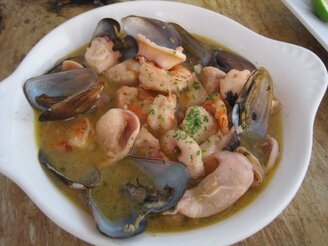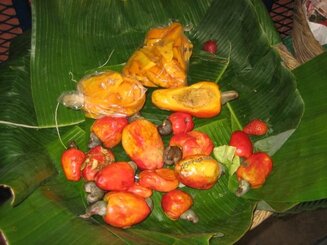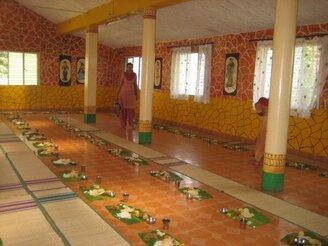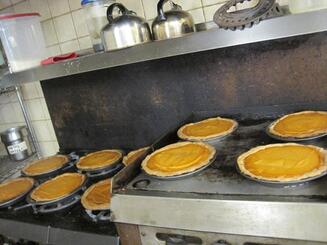|
Preparing food, and more so consuming food, are huge passions of mine. So what types of food are most likely to appear in my blog?
Moroccan food because my dad’s family is from Morocco 🇲🇦 Polish food because my maternal grandfather is from Poland 🇵🇱 Russian food because my maternal grandmother is from Russia 🇷🇺 Israeli food because I’m from Israel 🇮🇱 Ecuadorian food because my husband is from Ecuador 🇪🇨 Italian food because my husband’s grandfather is from Italy 🇮🇹 Salvadorian food because I lived in El Salvador 🇸🇻 Indian food because I lived in India 🇮🇳 Vegetarian food because I was an Ashram cook 🥬 Kid-friendly food because I’m a mom 🍪 And miscellaneous recipes because my interest in food and different cultures spans the globe 🌎 I am not one of those people who have been cooking since they were three. My mom was (and is) a bit of a clean-freak so it never occurred to her to let me make a mess in the kitchen. I myself was not too curious about how all this delicious food she cooked actually came together, and between my mom's incredible cooking and that of my extended family and favorite restaurants, I never felt a need to prepare the food myself. Once I moved out of my parent's home at 18 and joined the Israeli Defense Force (a mandatory draft which is still active in my homeland), I still had almost no exposure to cooking, as soldiers were not allowed into the base's kitchen. My palate wasn't developed much in my two years of military service, eating the Israeli version of Spam (called "luf"), dry bread with a chocolate spread, and various snacks from the canteen. In addition, basic training did a number on my digestive system, providing me with only seven minutes to complete each meal. I remember coming home after basic training and my mom cooking a lovely dinner for my extended family who came to visit. As I began inhaling my food off my plate without looking up, my mom elbowed me and whispered "Sharoni no one is going to take your plate away, please slow down, everybody is staring". Oops. Once I finished my military service and began my studies at Tel-Aviv University, I still didn't learn how to cook. I was living in a rental apartment with my childhood best-friend, and between take-out dinners and my mom sending me back with containers filled with my favorite dishes (such as gnocchi pesto) every weekend when I visited , I still felt no need to cook. Only when I transferred to a University in Florida did I begin a gradual journey towards learning how to cook. I was now far from my mother and my homeland, and in order to consume my favorite comfort foods I had to prepare them myself. That was about the same time I became a Vegetarian, so I was also motivated to recreate my dearly-missed favorite dishes with meat-substitutes. They say that need is the father of invention, and I needed to eat a plate of meatless Spaghetti Bolognese. The internet, my mom's advice via phone, and some creativity, all resulted in pretty successful dishes. As an avid traveler I always made sure to try all kinds of cuisines, and whenever I met someone from another country I would ask them to share with me a recipe of a typical dish. This resulted in my personal little cookbook containing some exotic and complicated recipes, along with some simple recipes. For example, when a Portuguese friend told me about her "French Onion Soup" recipe, I didn't realize at first that for her "French Onion" was actually Leek. Needless to say that soup was pretty much universal (leeks, potatoes, zucchini, carrots, onion, olive oil, salt, pepper) and didn't seem either Portuguese or French to me. However, both times I visited that friend and her family in Portugal I decided that Portuguese food was my absolute favorite of the European cuisines. It might not be as famous as the French or the Italian, but to me it was the winner. I fell off the Vegetarian wagon on several occasions, usually for months at a time. But that's for another blog post. In 2007 when I became close with a group of mostly Indian Yogis back in Washington DC, I became enamored with Indian cuisine. I started cooking Indian dishes and eating at Indian restaurants frequently, and pretty soon my knowledge of that cuisine grew. I spent most of 2009 in India, and man was I in culinary heaven. I never wasted my time or calories on the "western" menu options, and went straight for the Idly and the Dahl. I knew the Hindi name of most fruits, vegetables, and spices, and when my mom visited me in India she was shocked to watch me eat very spicy Indian food (with my hands usually) for breakfast, lunch, and dinner. She herself alternated between "Vegetable noodle" and "Vegetable rice", the staple "Western" menu options. Here I must interject that Southern Indian cuisine is in my opinion among the top three best cuisines in the world. I love it. My mom, on the other hand, gave the local cuisine a try on one occasion, and this resulted in a canceled tour and some Imodium. Don't think for a minutes that I haven't swallowed my share of anti-diarrheal medicine during the year I spent in India, but that too is for another post. Fast forward to 2010 when I moved to El Salvador. Everyone knows that Mexican food is delicious, with all it's tacos, burritos, and such. Among Latin cuisines, Peruvian food is also well known, and includes world-famous ceviches and chaulafan rice. But few people know that Salvadorian food is the bomb. Truly. When I visited El Salvador before deciding to live there for a while, I never expected my mind to be blown by the food. But it was. The seafood dishes are magical, the hearty chicken and meat dishes (I mentioned I am an on-again-off-again vegetarian) are like hugs from your grandmother (the nice one), and pupusas are the best invention since sliced bread. In El-Salvador I learned to cook Salvadorian food, and I also got to use incredibly fresh and delicious fruits and vegetable. They have produce there that seem like it was invented by fairies, such as Paterna, fava-bean-times-ten-like beans covered in a cotton-candy-like fuzz. No joke. My mom, once again un-wavering in her loyalty and love, came to visit me twice during the year and a half that I spent in El-Salvador. Though she fell in-love with the exotic fruits, and she scarfed-down the seafood like no-one's business, her exploration of pupusas resulted in yet another afternoon of canceled plans and Imodium. I guess not everyone can handle the rich cheese combined with the refried beans and washed down with a lager beer. But I sure can! After El-Salvador, I felt confident enough to work as the assistant manager of a Spiritual retreat's kitchen. It was in that year that I truly expanded my culinary repertoire, and started not only cooking a variety of dishes, but also started cooking for large groups. I felt great satisfaction cooking a meal start-to-finish and witnessing the visitors and staff leaving happy and well-nourished. One of the advantages of the Culinary Arts is that the result of your effort is immediate: the dish. I felt a sense of accomplishment every time I completed a meal, a feeling I didn't have when I used to perform long, tedious, and often boring scientific experiments. Even as a school teacher there was always a feeling of moving towards a further goal- quizzes, mid-terms, finals- and only at the end of the year was there a feeling of completion. But with cooking the goal is achieved usually within a few hours, and then you get to enjoy your creation with others. As a mom I am faced with new challenges when cooking. How can I appeal to a toddler's fickle, picky palate? How can I make quick dishes when hunger appears out of nowhere? How can I hide unliked ingredients in the dishes? Stay tuned for the answers to these questions, and for some toddler-friendly recipes which adults love too. Blessings and good vibes from me to you, Sharon
0 Comments
Leave a Reply. |
Sharon AzoguéTransformational Leader, Hypnotherapist, Archives
July 2022
Categories
All
|
Services |
Sharon Azogué
|
|





 RSS Feed
RSS Feed